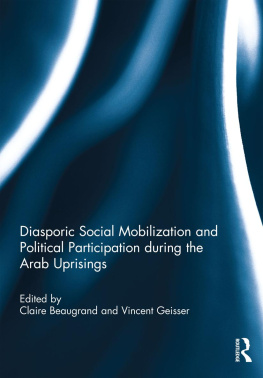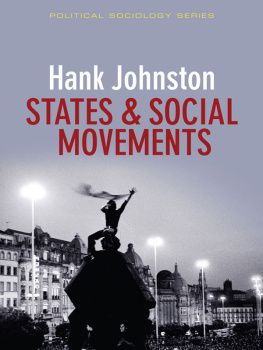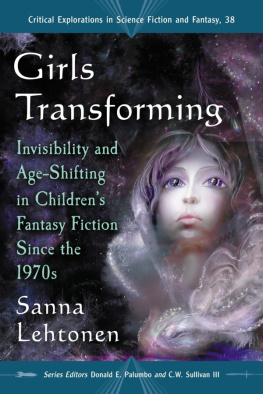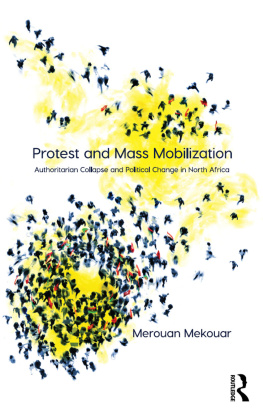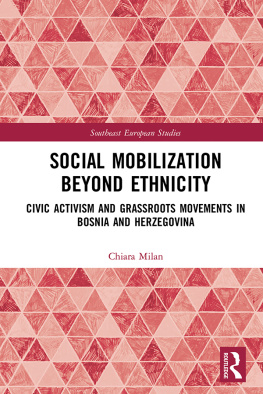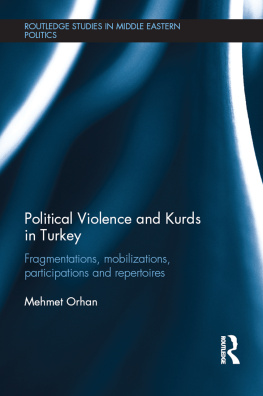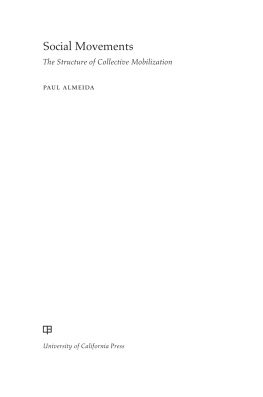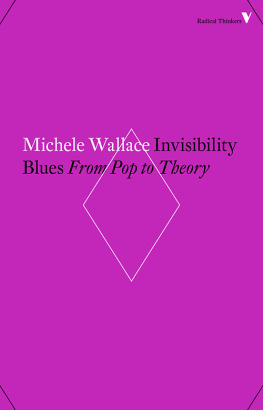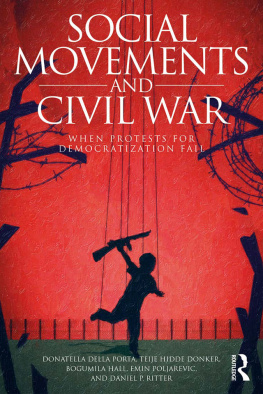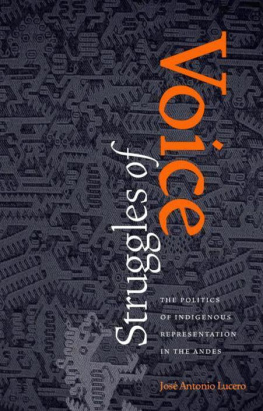
POLITICAL INVISIBILITY
AND MOBILIZATION
Political Invisibility and Mobilization explores the unseen opportunities available to those considered irrelevant and disregarded during periods of violent repression.
In a comparative study of three womens peace movements, in Argentina, the former Yugoslavia, and Liberia, the concept of political invisibility is developed to identify the unexpected beneficial effects of marginalization in the face of regime violence and civil war. Each chapter details the unique ways these movements avoided being targeted as threats to regime power and how they utilized free spaces to mobilize for peace. Their organizing efforts among international networks are described as a form of field-shifting that gained them the authority to expand their work at home to bring an end to war and rebuild society. The robust conceptual framework developed herein offers new ways to analyze the variations and nuances of how social status interacts with opportunities for effective activism.
This book presents a sophisticated theory of political invisibility with historical detail from three remarkable stories of courage in the face of atrocity. With relevance for political sociology, social movement studies, womens studies, and peace and conflict studies, it contributes to scholarly understanding of mobilization in repressive states while also offering strategic insight to movement practitioners.
Selina Gallo-Cruz is an Associate Professor at the College of the Holy Cross in Worcester, Massachusetts. Her research has contributed broadly to the fields of cultural, political, and global sociology, centering on questions about how cultural beliefs, values, assumptions, and practices shape social movement mobilization.
ROUTLEDGE RESEARCH IN GENDER AND SOCIETY
86 Young, Disabled and LGBT+
Voices, Identities and Intersections
Edited by Alex Toft and Anita Franklin
87 Transdisciplinary Feminist Research
Innovations in Theory, Method and Practice
Edited by Carol A. Taylor, Christina Hughes, and Jasmine B. Ulmer
88 Identity, Belonging, and Community in Mens Roller Derby
Dawn Fletcher
89 The Gender-Sensitive University
A Contradiction in Terms?
Edited by Eileen Drew and Siobhan Canavan
90 Trauma Transmission and Sexual Violence
Reconciliation and Peacebuilding in Post-Conflict Settings
Nena Monik
91 Men, Masculinities and Intimate Partner Violence
Edited by Lucas Gottzn, Margunn Bjrnholt, and Floretta Boonzaier
92 Political Invisibility and Mobilization
Women against State Violence in Argentina, Yugoslavia, and Liberia
Selina Gallo-Cruz
93 Multiple Gender Cultures, Sociology, and Plural Modernities
Re-reading Social Constructions of Gender across the Globe in a Decolonial Perspective
Edited by Heidemarie Winkel and Angelika Poferl
94 Women of Faith and the Quest for Spiritual Authenticity
Comparative Perspectives from Malaysia and Britain
Sara Ashencaen Crabtree
For more information about this series, please visit: https://www.routledge.com/Routledge-Research-in-Gender-and-Society/book-series/SE0271
First published 2021
by Routledge
2 Park Square, Milton Park, Abingdon, Oxon OX14 4RN
and by Routledge
52 Vanderbilt Avenue, New York, NY 10017
Routledge is an imprint of the Taylor & Francis Group, an informa business
2021 Selina Gallo-Cruz
The right of Selina Gallo-Cruz to be identified as author of this work has been asserted by her in accordance with sections 77 and 78 of the Copyright, Designs and Patents Act 1988.
All rights reserved. No part of this book may be reprinted or reproduced or utilised in any form or by any electronic, mechanical, or other means, now known or hereafter invented, including photocopying and recording, or in any information storage or retrieval system, without permission in writing from the publishers.
Trademark notice: Product or corporate names may be trademarks or registered trademarks, and are used only for identification and explanation without intent to infringe.
British Library Cataloguing in Publication Data
A catalogue record for this book is available from the British Library
Library of Congress Cataloging-in-Publication Data
Names: Gallo-Cruz, Selina, author.
Title: Political invisibility and mobilization : women against state violence in Argentina, Yugoslavia, and Liberia / Selina Gallo-Cruz.
Description: Abingdon, Oxon ; New York, NY : Routledge, 2021. | Series: Routledge research in gender and society | Includes bibliographical references and index.
Identifiers: LCCN 2020032407 (print) | LCCN 2020032408 (ebook) | ISBN 9780367856939 (hardback) | ISBN 9780367465865 (paperback) | ISBN 9781003014416 (ebook)
Subjects: LCSH: Women and peace. | Women--Political activity. | Peace movements--Argentina. | Peace movements--Yugoslavia. | Peace movements--Liberia. | State-sponsored terrorism--Argentina. | State-sponsored terrorism--Yugoslavia. | State-sponsored terrorism--Liberia.
Classification: LCC JZ5578 .G355 2021 (print) | LCC JZ5578 (ebook) | DDC 303.6/4082--dc23
LC record available at https://lccn.loc.gov/2020032407
LC ebook record available at https://lccn.loc.gov/2020032408
ISBN: 978-0-367-85693-9 (hbk)
ISBN: 978-0-367-46586-5 (pbk)
ISBN: 978-1-003-01441-6 (ebk)
Typeset in Times New Roman
by Taylor & Francis Books
CONTENTS
There have been countless times in my life that I have experienced social invisibility. A significant part of what minoritized peoples hold in common is the experience of exclusion. And a significant dimension of exclusion is that experience of being denied and disregarded, not fitting into the socially constructed criteria of what counts as eligible, capable enough, or authoritative enough for a particular position, for respect, leadership, inclusion, or even just acknowledgment.
Sociologists have long understood that perception is a deeply social process, imperfect and contradictory, liable to a multitude of rationalities but often profoundly anchored in socialization and societal norms. Perception is imperfect by default, sometimes tragically so. But as it becomes reality, it, in turn, deeply structures our lives. Ifand anything socially constructed comes with an ifwe are diligent and committed, perception can also be refined through an intentional process of reflection and validation. Social movements have been needed to shift collective consciousness and understandings; the current climate of race relations in the United States should indicate that this can be a long and difficult process, with giant steps backward possible amid many twists and turns. Still, even when constraints seem to far overshadow opportunities, a life of often-invisibility has led me to unsought-for but advantageous realizations, not least of which is that our individual and collective cognitive blind spots often cause us to overlook talent, value, skill, and a diverse array of meaningful social contributions.
From the standpoint of the invisible, the pressures of gaining visibility and the stresses of experiencing invisibility are many. That minoritized people have to work twice as hard to get half as far is well understood among those of us who have lived it. (Unless you are among those who have taken the shortcuts to personal mobility occasionally offered by playing to power in dishonest ways.) The propensity of incumbent powerholders to view newcomers successes as threatening to their privilege, and to react with repression, is also an experience many of us have known and confronted. (As I discuss in , minoritization can confer not only invisibility but malignant forms of visibility.) It is for these reasons that the negative effects of dismissal and invisibility people so often experience in settings where they have unwittingly been minoritized have been the stuff of social justice research and advocacy, with some frustrating and also illuminating revelations.


